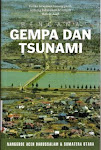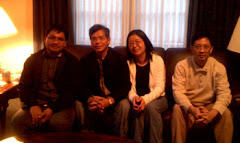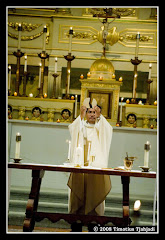Saya mengirimkan abstract "The Politics of Anamnesis: The Subversive Memory of Jesus in a Criminal Country" untuk seleksi dalam rangka konferensi "Ten Years After: Reformasi and New Social Movements in Indonesia, 1998-2008” yang diselenggarakan UC Berkeley dan UCLA. Target awalnya sederhana saja agar kedua institusi akademik ini mengetahui bahwa saya peduli dengan persoalan-persoalan kemanusiaan Indonesia.
The Politics of Anamnesis:
The Subversive Memory of Jesus in a Criminal Country
By Patrisius M. Andalas
The politics of anamnesis conveys my politico-theological journey interpreting the life of the victims of the May tragedy of 1998 in conversation with the life of Jesus. It arises from personal encounters and involvements with the victims that have challenged me to read the story of Jesus as a subversive memory. It portrays Jesus as a witness of God who resisted criminal regimes that worshipped idols of death and sacrificed innocent lives. The subversive memory of Jesus helps my pilgrimage to see the suffering people who have defended their sacred lives under a criminal regime. Jesus opted for the God of life and fought against historical idols of death. The Church who follows Jesus faithfully recognizes her task to witness divine love publicly in a criminal regime.
The politics of anamnesis arises as a politico-theological critique to the politics of amnesia. It encounters the family of victims who reclaimed the dead, injured, and even missing bodies and interpret sufferings that resided in their bodies, yet often hidden from public. It listens to the family of the victims who shared their memories of victims and defended their innocence. It supports their struggle to seek the truth of May tragedy and challenges the criminal regime who has considered the crime against humanity banally.It resists the criminal regime that idolizes the criminals against humanity and criminalizes the victims and survivors of the May tragedy.
It observes critically commonly used words, such as penjarah (looter), kerusuhan (riot), and provokator (provocateur) to speak about the tragedy. It creates a resistant language that denounces the banality of evil and announces the sanctity of the victim.
The survivors and the family of victims posed a brief question after the May tragedy. Why? When they saw indications of government involvement in orchestrating the tragedy, they asked the question,” why you killed them?” These questions led them gradually to consider the May tragedy as a crime against humanity. The survivors and the families of victims reject the politics of amnesia because it destroys history by escaping these political questions. They unveiled the identity of the criminals against humanity that worshipped the politics of amnesia. The politics of amnesia by design deprives humanity of victims as it victimizes them.
The survivors and the families of victims have considered the important role of religious communities in pursuing justice for the victims. They have helped the Church to re-imagine politics as a transformative act and the politics of victimization as a dehumanizing act. They have invited the Church to shift her discourse on idolatry from theological concept to anthropological realities. The Church should participate in transforming politics and its structure from the danger of idolatry. She envisions a cultured politics that defends the sanctity of victims and challenges the banality of evil.
The Church realizes that a crime against humanity by design degrades the humanity of victims and assumes her role as a public witness to the victims. The Church should proclaim the God of life by exposing historical idols, defending historical victims, and humanizing society.




















2 comments:
Mudah-mudahan tujuannya tercapai dan dipilih jadi salah satu presenter, Romo.
Go for it, Mo. Saya belum sempat ni, masih sibuk sama COMP, bulan Feb ini dah suibuk lagi ama Mas Dis... ertasi. :)
Post a Comment